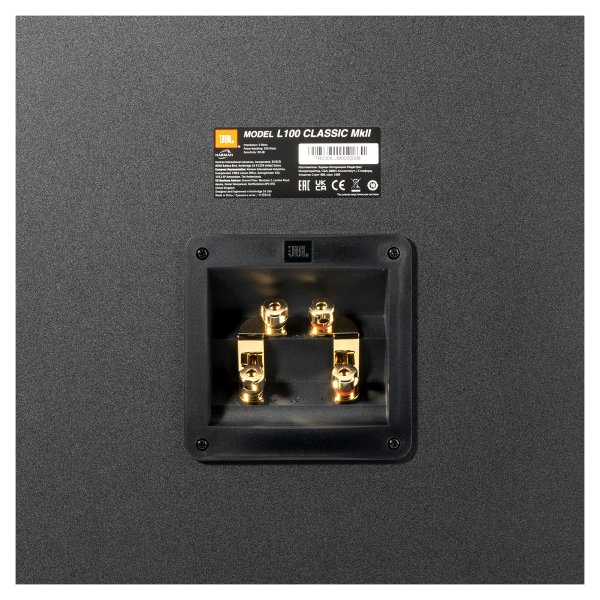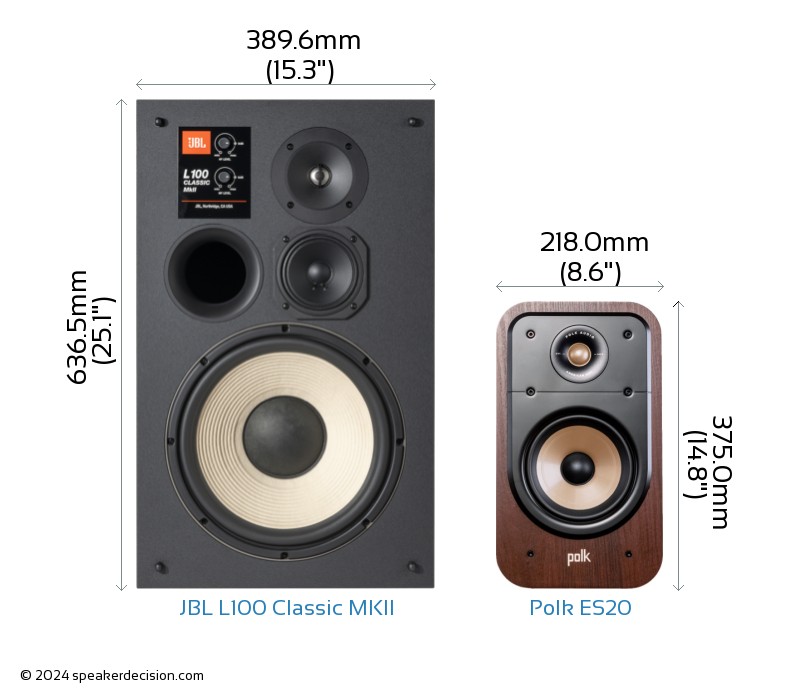In this review, we will be comparing L100 Classic MKII and ES20, two Passive Bookshelf speakers from JBL and Polk Audio.
Let's have a brief look at the main features
of JBL L100 Classic MKII and Polk ES20 first before getting into our more
detailed comparison.
JBL L100 Classic MKII Key Specs
- 3-way Design
- 1" Dome Tweeter
- 5.25" Midrange
- 12" Pulp Woofer
- 40-40k Hz Frequency Response
- 90 dB Sensitivity
- Impedance: 4ohms
- Power Range:25-200watts
- Weight:28.60kg
- Dimensions (H x W x D): 636.5" x 15.3" x 14.6"( 636.5 x 389.6 x 371.5mm )
Polk ES20 Key Specs
- 2-way Design
- 1" Soft-Dome Tweeter
- 6.5" Mica-reinforced polypropylene Woofer
- 41-40k Hz Frequency Response
- 86 dB Sensitivity
- Impedance: 8ohms
- Power Range:20-125watts
- Weight:7.73kg
- Dimensions (H x W x D): 375.0" x 8-9/16" x 13-13/16"( 375.0 x 218.0 x 351.0mm )
What size room are the JBL L100 Classic MKII and Polk ES20 speakers good for?
The size of the room in which you are planning to use these loudspeakers is an important decision
factor. Here we have compared their suitability to various sizes of environments considering their size
and max power parameters:
| Listening Environment* |
JBL L100 Classic MKII |
Polk ES20 |
| Near-field |
Poor |
Poor |
| Small Room |
Average |
Average |
| Mid-size Room |
Good |
Good |
| Large Room |
Average |
Average |
| Very Large Room |
Poor |
Poor |
(* Approximate Room sizes: Small < 100sq. ft / 9 m2,
Mid-size: 100-220 sq. ft / 9-20 m2, Large 220-400 sq. ft / 20-36 m2, Very Large: >
400 sq. ft / 36 m2.
Average Floor Height: 9" / 2.7m. Typical room sizes differ from country to country, and the actual
listening experience changes depending on floor height, room shape, surface materials, listening
position, speaker locations, etc.)
In the following sections, we will get into more detail in order to better understand how the JBL L100 Classic MKII and Polk ES20 compare and hopefully end up with enough arguments to decide which one of these loudspeakers is the better choice for you.
**This post contains affiliate links, and I will be compensated if you make a purchase after clicking
through my links. As an Amazon Associate I earn from qualifying purchases.
Drivers
One of the fundamental differences between these two speakers is that L100 Classic MKII is a 3-way design whereas the ES20 is a 2-way speaker. 3-way designs utilize a midrange driver in addition to the tweeter and woofer on 2-way designs. Designing a crossover for a 3-way speaker is a complicated process and generally increases the overall cost of the speaker.
| Driver |
JBL L100 Classic MKII |
Polk ES20 |
|
Driver Setup
|
3-way
|
2-way
|
|
Tweeter
|
1-inch
|
1-inch
|
|
Midrange
|
1 x 5.25-inch |
- |
|
Woofer
|
1 x 12-inch
|
1 x 6.5-inch
|
L100 Classic MKII features a 1" Titanium Dome Tweeter , a 5.25" Midrange and 1 x 12" Pulp Woofer with a Crossover frequency at 450Hz and 3500Hz. On the other hand, the ES20 features a 1" Terylene Soft-Dome Tweeter and 1 x 6.5" Mica-reinforced polypropylene Woofer with a Crossover frequency at 2500Hz.
Frequency Response
L100 Classic MKII has a frequency range of 40-40k Hz whereas ES20 has a frequency range of 41-40k Hz. With a minimum frequency of 40Hz, the L100 Classic MKII can go slightly deeper then the ES20's min frequency of 41Hz.
Below graphs depict how these two speakers compare with the max, min and average values of the Min and Max Frequencies of other speakers in the Bookshelf class in our database.
Low Frequency
Bookshelf Speakers
High Frequency
Bookshelf Speakers
None of these speakers achieves full range experience which is commonly agreed as 20Hz-20kHz. In order to achieve lower lows / deeper bass, we recommend you pair these with a subwoofer. Visit our Powered Subwoofers section to find out more about the available options.
Impedance and Sensitivity
L100 Classic MKII is a 4 ohms speaker compared to the ES20 which has a nominal impedance of 8 ohms. Lower impedance speakers, especially the ones that are rated at 4 ohms may put more pressure on the amplifier unit especially when played at high volume levels, so make sure the amp you pair with the L100 Classic MKII can provide this impedance level.
These two speakers also have different sensitivity levels. L100 Classic MKII sensitivity is rated at 90 dB and the ES20's is rated at 86 dB. This 4 dB difference makes the JBL L100 Classic MKII a more sensitive speaker compared to Polk ES20, hence will play louder with the same amount of watts.
Sensitivity
Bookshelf Speakers
Power Range
Power
range is the range of input power in watts RMS that a loudspeaker is designed to handle. While using
an amplifier within this range ensures the nominal performance , inputting a power that is higher than the
max wattage can result in a damaged speaker.
L100 Classic MKII can handle a max power of 200 watts RMS from the amp the whereas ES20 has a max power handling value of 125 watts RMS, 75 watts less than the L100 Classic MKII.
Keep in mind that a higher max power handling value doesn't necessarily make that a louder speaker
compared to a lower max handling speaker. Loudness or the sound level is also impacted by parameters
such as Impedance, sensitivity and system efficiencies.
Input Type and Bi-Amping / Bi-Wiring
L100 Classic MKII features Five-way gold-plated binding posts posts which make bi-amping or bi-wiring possible. ES20 has a 5-Way post which doesn't feature bi-amping/bi-wiring.
 JBL L100 Classic MKII's Five-way gold-plated binding posts terminals allows Bi-amping or bi-wiring
JBL L100 Classic MKII's Five-way gold-plated binding posts terminals allows Bi-amping or bi-wiring
Cabinet Type and Port Position
L100 Classic MKII has a front firing port whereas ES20 has a rear firing ports. JBL L100 Classic MKII's front-firing port gives more flexibility in placement in regards to proximity to walls compared to Polk ES20 with its rear-firing port.
Physical Specs
Size of a speaker can sometimes become an important decision factor due to space constraints or in some cases purely for esthetic reasons. In this section, we are going to compare JBL L100 Classic MKII's and Polk ES20's external dimensions. JBL L100 Classic MKII has external dimensions of 636.5 x 389.6 x 371.5mm ( 25.0 x 15.3 x 14.6inch) whereas Polk ES20 has external dimensions of 375.0 x 218.0 x 351.0mm ( 14-3/4 x 8-9/16 x 13-13/16inch) .
JBL L100 Classic MKII is clearly the larger of the two speakers. Its body is 171.6mm wider, 261.5mm taller and 20.5mm deeper than Polk ES20.
Below you can see the front view size comparison of JBL L100 Classic MKII and Polk ES20 in scale.
 Comparison image of JBL L100 Classic MKII and Polk ES20 Size and External Dimensions
Comparison image of JBL L100 Classic MKII and Polk ES20 Size and External Dimensions
Base Surface Area Comparison
Base surface area of a loudspeaker may become a determining factor when the space in your room or desk is limited.
The base surface area of the JBL L100 Classic MKII is approximately 1447.4cm2 / 224.3inch2 and base area of the Polk ES20 is approximately 765.2cm2 / 118.6inch2. The L100 Classic MKII requires 89% more surface area than the ES20 which gives it a small disadvantage on placement in tight spaces.